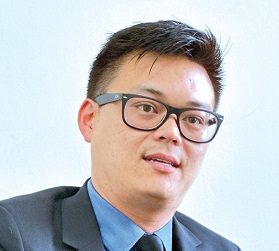[Nex-Gen Leader: Justin Kim]

“It is a prosecutor’s highest ethical duty to present the truth, even if you lose the trial.”
Justin Kim, a Felony Trial Deputy in the Central Trials Division of the Los Angeles County District Attorney’s Office, has been a Deputy District Attorney for nine years, starting in 2015.
While 90 percent of prosecutions in L.A. County end in plea bargains, the rest go to trial.
Working at the Clara Shortridge Foltz Criminal Justice Center in downtown Los Angeles, Kim has handled hundreds of cases and has tried 37 trials, including 12 misdemeanors and 25 felonies.
Currently, Kim is handling more than 30 felony cases, including 10 homicides and several robberies, hate crimes, and assaults.
Kim emphasizes the ethical obligations of prosecutors. “In Korea, prosecutors have the power to investigate, but U.S. prosecutors are litigators. Of course, winning is important for a prosecutor, but it’s different from the concept of winning for a lawyer. If the truth is revealed and an innocent person is exonerated, losing is something to celebrate.”
Kim is the son of Keith Kim (father), a well-known criminal defense attorney in the LA Korean community, and Min Kim (mother), president of Open Bank.
“When I was a kid, I was proud of my dad,” he said, “and I’m proud that even though we have opposite roles as lawyers and prosecutors, we’re ultimately working towards the same goal – helping people.”
“Just like in soccer, there are attackers and defenders, I am more suited to offense than defense, so I dreamed of being a prosecutor since I was a law school student,” Kim said.
He recalled that the first trial he worked on as a law clerk was a robbery case in which a Korean American business owner was shot and killed. “Looking at the photos and evidence of the victim, I was worried, ‘Can I really do this?'” he said. “But when I saw the bereaved family express tearful gratitude as they held the hand of the prosecutor who convicted the accused, I was convinced to become a prosecutor.”
However, Kim noted that the social climate toward prosecutors is much different than it was seven or eight years ago. “When I enter the courtroom, jurors often give me suspicious glances. It’s as if the prosecutor is perceived on the bad side,” he said, adding, “It’s getting harder and harder to indict (criminals).”
According to Kim, the increase in homelessness and crime since the pandemic, coupled with a backlog of cases, has led to more work but fewer prosecutors. The pandemic has changed the social climate, he said, and the arrival of District Attorney George Gascón has also made a difference.
“Gascón is very different from the previous District Attorneys,” Kim said. “He understands the frustration of police officers who make arrests but don’t get charged. Many prosecutors are leaving because they don’t understand the current situation.” “I don’t see that changing in the near future,” he said, adding, “We’re going through a difficult time.”
The L.A. County District Attorney’s Office, the largest in the country, is responsible for prosecuting misdemeanors in 78 of the 88 cities in the county that do not have their own district attorneys, as well as felonies countywide.
The L.A. County District Attorney’s Office currently employs 800 prosecutors who work in criminal courts in downtown L.A. and in local courts throughout the county. According to Kim, there are currently 40 to 50 Korean American prosecutors in the L.A. County District Attorney’s Office.
BY SUAH JANG [jang.suah@koreadaily.com]





